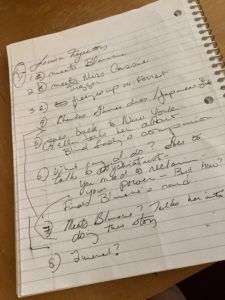How Building a Porch is like Writing a Novel
The Porch
First of all, it costs so much more than you think it’s going to cost. After countless permits and inspections, some guys come and lay a concrete foundation. Of course there’s more than one screw up. They get concrete on your “art” door. They get concrete on the siding. The concrete they do lay down is rough and they wind up firing one guy. Finally the concrete is down and smooth (but blotchy and you know you’ll have to paint it!). You congratulate yourself for not scrawling your initials into the concrete.
Then there’s guys banging around and pretty quickly they have the frame up so you think, oh, this is going quicker than I expected, but then there’s rain and one of the crews simply fails to show up.

The roofers come. Lots of banging overhead. You’ve purchased a sun tunnel so that your kitchen will have some natural light, but once it’s in, it’s not nearly as much light as you expected. And then there’s leaves and stuff in it that you’ll have to remove.
The electrician comes and asks you if you want a switch or just a remote for the ceiling and you can’t decide. And then they must wait for an inspection. Your electrical passes inspection and now there’s siding on the bottom half of the porch, but you sort of wish maybe it was a little lower or maybe that you’d opted for screen instead of siding. But too late. You’ll live with it.

Your biggest question is whether the screen door should open outwards or inwards. You debate this for days until finally they build the opening so you have to open it outwards and the issue is decided.
The painters want to know if you have any left over paint from when they were here a couple of years ago. So you go in the garage where you have all the furniture from your previous marriage that you couldn’t bring yourself to get rid of and you find one huge old bucket of paint and have no idea what color is inside. You drag it over to the garage door so the painter can look at it.
A friend comes over to sit on your porch but it’s not done yet! Finally the painters arrive and then the screens come on, and you really should paint the floor but damn you’ve spent so much money (money you took from the retirement account that is nowhere near what “they” all say you need) and so you find some used furniture, put your feet up on the table, turn on your ceiling fan and say to yourself, this is it. And you realize you’ve been wanting this damn near all your life.

The Novel
First it takes so much longer than you thought it. You pore over your ideas until you find one you think you can live with four or five months — or four or five years. Then you start your outline. You ponder the possible goals your main character might have. Then you decide how you’d like this book to end. And then you stare at the screen and wonder about the middle. You ponder this for days, then weeks, and then you put something down, realize it is stupid, but you move forward anyway. You’ve got several chapters done when someone in your writing group remarks how similar this plot is to a book you’ve already written. Why even some of the character names are the same — even though they aren’t holdover characters. So you go back to your outline and fire some of the ideas and feel despondent.

You come back with some new ideas and try writing a couple of chapters down to see if the ideas hold water. No idea but you’re moving forward no matter what. Every decision feels so momentous. Should the character actively engage or should this be the moment of the refusal of the call? You slog and slog. Some days, the workers in your head just don’t show up. Some days, it’s raining and they’d rather lie in bed and read a book. Some days they’re hungover.
But finally, slowly, the frame gets built. Then you put in some transitions. About halfway through, you find the giant plot hole, and after a nice bath, you figure out how to fill it. At some point, a draft is done. Then you roll up your sleeves and you add, you subtract. You add and subtract some more. You add and subtract some more. And then you beg someone to read it, tell you where you need to add, where you need to subtract.
After one, two, three, four drafts, and just as many proofs you’re done. Maybe. You go sit on your porch with a glass of wine and think: at least I’m doing what I’ve wanted to do damn near my whole life.
